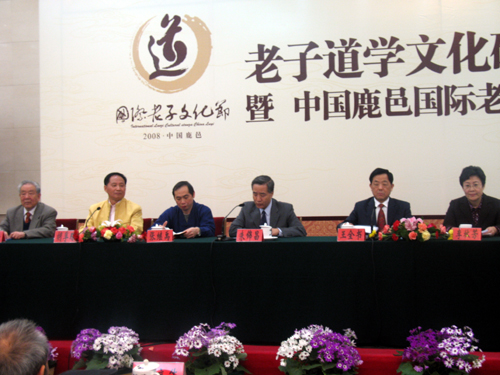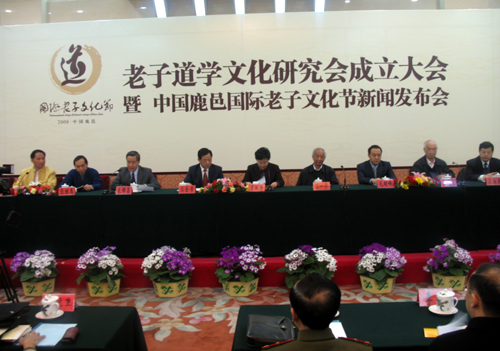
By Keen Zhang
zhangr@china.org.cn
"We have waited for 30 years to see the association materialize," Ge Rongjin, a professor from Renmin University of China, said emotionally in his speech at the launching conference of the Research Association of Laozi Taoist Culture (CRALTC) Friday. He now serves as the association's top advisor.
At the Henan Hall in the Great Hall of the People, Beijing, leaders of the Chinese Academy of Social Sciences and Henan Province as well as scholars, Taoist followers and guests witnessed the inauguration.
"30 years ago, Chinese scholars called for such association. In 1993, Professor Tang Yijie of Peking University, also a researcher with the Chinese Academy of Social Sciences at that time, came to me to discuss the possibility," Hu Fuchen, currently the chairman of the association. He added, "Although there are already many Confucian institutions, we have none in Taoist area."
Taoist scholars submitted applications to create the organization but the motion was put on the shelf until in 2005, when Henan Province's Zhoukou municipal leaders wanted to hold an "International Laozi and Taoist Seminar", the idea of the association resurfaced again.
In January 2008, they finally got the green light from the Ministry of Civil Affairs to establish the first Taoist research association. Many at Friday's press conference were either excited or relieved, as it took many years for the association to come into fruition. Tang Yijie, the organization's initiator, serves as an honorary chairman as he is already in his 70’s and retired.
Ge Rongjin expects an academic magazine and commercial products, as well as an even larger international Taoist conference in the future.
China has started to invest more money and attention into Taoism after it has successfully exported Confucianism to the world by establishing hundreds of Confucian institutes and schools around the world. China.org.cn reporters witnessed the largest ever international Daodejing forum held in Xi'an and Hong Kong last year. Daodejing, the Taoist bible, is one of the most widely published books on the planet, only second to the Christian Bible.
Chairman Hu Fuchen called the inauguration of the association a "grand event" that 70 million Taoist followers have long anticipated. However, he's worried about the current cultural impact from the West. "We have witnessed our rapid economic growth, but also have to admit our 'culture deficit'," he said, proud of Chinese culture but called Hollywood and its celebrities "not so cultural" since the United States has a younger history than China.
He also remarked, "American culture has huge influence worldwide, and this, of course, affects China. Many Chinese think 'Americanization' is just another word for modernization, but that's wrong. Americanization is a political export backed up by American state power. It’s not a normal cultural exchange." He added that many western philosophers and scientists, such as Georg Wilhelm Friedrich Hegel and Albert Einstein, were actually big supporters of Laozi and his Daodejing.

Tang Yijie, one of the association founders, echoed that point of view, "The revival of China is closely tied with the revival of Chinese culture. In Chinese thought, Taoist philosophy is one of the three most important pillars along with Confucianism and Buddhism, which co-breed and shape Chinese culture. This is the root of our culture. If we cut out the root, then the so-expected revival will be a big question mark. "
Mao Chaofeng, the Party chief of Zhoukou City in Henan Province, also announced at the press conference that on May 20 they will hold an International Laozi Taoist Cultural Festival in their small county Luyi, the hometown of Laozi, the ancestor of Taoism.
Taoism, which takes the Tao of Laozi as its highest principle, is an indigenous traditional Chinese religion whose fundamental purpose is to help seekers attain transcendence. Taoism originates from ancestor worship, belief in ghosts and gods, Taoist philosophy, as well as mystical practices.
Many scholars have said they believe the concepts from Taoism will be a solution to many world issues, such as dealing with the relationship between human and nature. "Building a harmonious society", a very popular slogan from Chinese central government, is deeply rooted in Chinese Taoist culture.
However, during past decades, Taoism was heavily regarded as the one closely associated with feudalist dynasties and folk superstitions among the Chinese government and people, so it was ignored by many and remained less-developed. But now, as the nation is beginning to be enthusiastic about traditional culture, Taoism, along with this newly-established Taoist research association, may bear witness to this new revival.
(China.org.cn March 31, 2008)